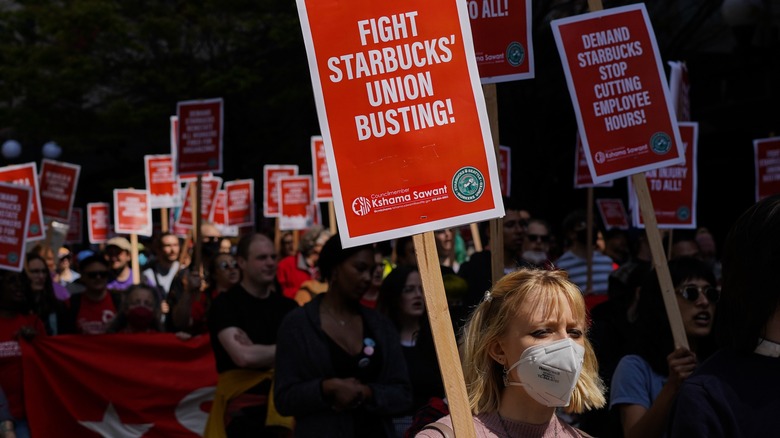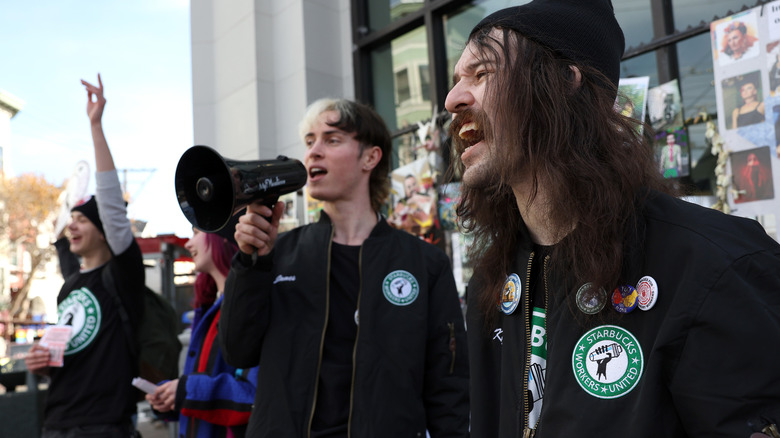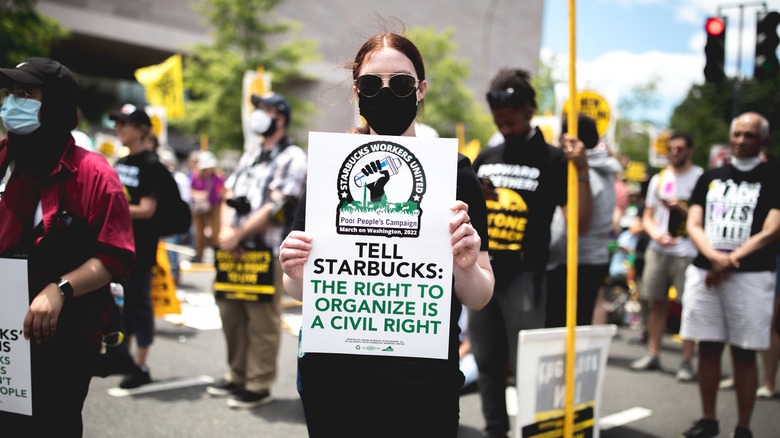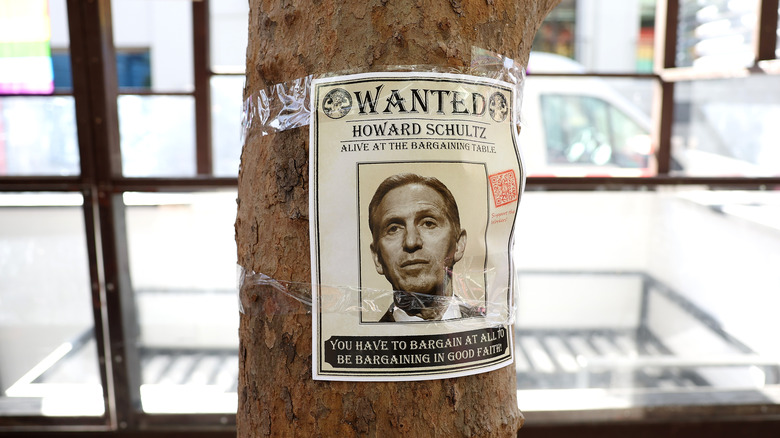Starbucks Has Seriously Crossed The Line With Its Union-Busting
In 2021, a Starbucks in Buffalo, New York, became the first of over 8,000 U.S. locations to unionize. The popular coffee chain's fair labor initiatives arrived alongside a slew of other corporate union efforts led by economic powerhouses like Amazon, Apple, and Google. But this uptick in labor efforts isn't random. During the pandemic, front-line workers (yes, that includes the baristas who showed up to make lattes for us as COVID-19 swept the globe) were forced to continue servicing the public despite the known health risks of exposure to the disease.
But concerns over the pandemic were just the tip of the iceberg for Starbucks employees. While employees spoke up to ensure safe labor conditions during the pandemic, staff members noted that many of these inequitable and unsafe conditions had actually defined their working environment for years prior to 2020. Ultimately, the pandemic was the catalyst that triggered widespread outrage among Starbucks employees and lifted the corporate veil that masked decades of unfair labor practices.
Today, 285 Starbucks locations across the nation have successfully unionized. While it might sound like a promising start, corporate juggernauts at Starbucks leave much to be desired when it comes to satisfying the well-deserved demands of the franchise's employees. These corporate union-busters put profits above people and boast a flagrant disregard for human rights and fair labor laws.
Starbucks refers to its employees as partners but doesn't treat them as such
The corporate leaders at Starbucks corporation present a righteous facade by calling its employees "partners" and offering to cover their college tuition. But if the company is willing to invest in workers' higher education and go as far as to call them partners of the company, why does it put up a fight when it comes to satisfying their demands for fair labor? This is an unfortunate yet classic example of performative action.
Performative action is a tool often used by corporations and big-name brands to manufacture the appearance of advocacy while not committing to the action of change itself. Insincere, performative tactics protect Starbucks from public outrage as corporate heavyweights illegally fire union leaders, shut down Starbucks locations that are on track to unionize, and boost pay for non-union members.
Starbucks is considered the second most popular fast-food chain in the United States, trailing only behind McDonald's. Each week, the infamous coffee shop tends to over 60 million customers. The chain's baristas are responsible for managing complex, customizable beverage orders for millions of Americans in a demanding, fast-paced environment.
If you've ever been to Starbucks, you know that these baristas manage the unrelenting chaos with poise and grace: They're not just partners, they are the institution itself. Starbucks' corporate giants have painted a deceitful picture of occupational security with empty gestures under the guise of catchy taglines and friendly jargon.
Starbucks unions demand basic human rights
Unionizing gives workers more say over their scheduling, salary, safety, and benefits. A well-organized union votes for leaders who can effectively champion workers' rights while the union as a whole works towards developing an outline for a more equitable and fair working environment. Starbucks refuses to honor the unionizing efforts of its employees even though the union is essentially just demanding a list of basic human rights.
Some of the action items listed in the union proposal include demands like non-discrimination, zero-tolerance for sexual harassment, guaranteed schedules, and freedom from verbal abuse from supervisors and co-workers. Are American corporations so committed to upholding an outdated model of capitalism that they've completely lost touch with humanity? Have they become servants of a system that refuses to engage in a mere conversation about discrimination and sexual harassment in the workplace?
Even some of the economic action items in Starbucks' union proposal, which include demands like no reduction in wages without negotiation and benefits for those working less than 20 hours a week, are elementary fair labor practices.
Starbucks employees deserve the right to make changes to the environment they work in free from corporate intimidation. They deserve honor, respect, and most importantly, a livable wage and safe working conditions. Any corporation that blatantly denies these demands is a corporation that refuses human rights to the very people who operate the company.
Hope is on the horizon
Interim CEO of Starbucks Howard Schultz told CNN that he doesn't think a union belongs in Starbucks. He went on to say that while employees may have the freedom to unionize, Starbucks' corporate leaders have a divergent and more effective version of the union's list of demands. Perhaps it's lost on him that having a disparate version of complying with fair labor laws means subjecting employees to unsafe, immoral working conditions.
Despite Schultz's out-of-touch comments, Judge Michael A. Rosas, a judge at the National Labor Relations Board, just ruled that Schultz and other corporate leaders at Starbucks must pay back damages owed to the employees who were illegally fired and barred from unionizing efforts. Rosas went on to say that Starbucks committed abhorrent and pervasive labor violations.
This ruling protects Starbucks union employees from corporate intimidation and ensures a stronger sense of job security. Schultz will testify in front of the Senate on March 29, 2023, in an effort led by Vermont senator and certified union man Bernie Sanders. Sanders said that he was interested to hear how Schultz would cease anti-union policies and commence signing fair agreements with unions. Considering the union-busting tactics of Starbucks, it's now more important than ever before to support your local Starbucks union!



